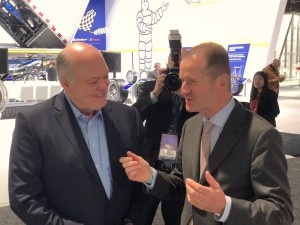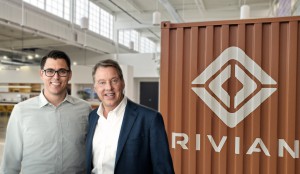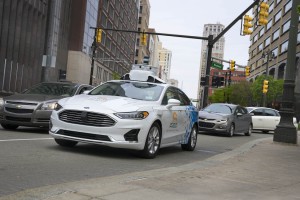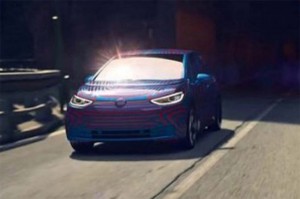
Ford CEO Jim Hackett, left, and VW AG CEO Herbert Diess were all smiles at the Detroit Auto Show last January just before announcing their first joint venture.
Ford and Volkswagen are planning to announce two new joint ventures by as early as Friday that would have them pair up on the development of autonomous and electrified vehicles, TheDetroitBureau.com has confirmed with numerous sources close to the negotiations.
The projects, which would see the two companies come up with “billions” of dollars in investments, follow an initial joint venture announced last January that has led to Ford and VW pooling resources in the commercial vehicle arena.
Barring an 11th hour hitch, VW will take a stake in Argo AI, a Pittsburgh-based autonomous vehicle research company heavily backed by Ford. The German automaker also will provide Ford access to its MEB vehicle architecture, the underlying platform it plans to use for most of the roughly 50 battery-electric vehicles, or BEVs, the German company plans to bring to market by 2025.
“AVs (autonomous vehicles) are the big deal” when it comes to the partnerships Ford and VW are working up, said a ranking source close to the negotiations.
The technology is expected to begin playing a major role in the transportation world over the coming decade, starting with vehicles that can assist drivers. Longer-term, the goal is to develop vehicles that won’t need a driver at all. So-called Level 4 and 5 vehicles are expected to make major inroads in trucking and ride-sharing services and could significantly cut into sales of new vehicles by making it more affordable to turn to robo-cabs.
But while there are now thousands of autonomous vehicle prototypes roaming U.S. roads, the cost of development is steep. A study released last month by AlixPartners estimates automakers will collectively be spending $85 billion annually by 2025, a figure that will strain their resources and encourage manufacturers to pair up – as erstwhile rivals BMW and Daimler announced they would this month.
(BMW, Daimler team up to develop autonomous vehicles. Click Here for the full story.)
The proposed autonomous vehicle joint venture between Ford and VW would be centered around Argo AI, a Pittsburgh-based tech firm considered one of the leaders in the field. While it operates as an independent enterprise, Ford is its primary partner, the automaker having invested $1 billion in the start-up in 2017. “They have a significant say” in what Argo does, said one of the sources that spoke to TheDetroitBureau.com on background due to the sensitive nature of the discussions.
VW, the source suggested, will likely invest “billions” in Argo, as part of the deal, the higher figure reflecting the increase in the tech firm’s value since Ford took its initial stake.
Argo currently runs autonomous vehicle test programs in five U.S. cities: Pittsburgh, Detroit, Washington, D.C., Palo Alto and Miami – making it one of the few companies in the field currently testing in cold climate conditions, a particular challenge for AVs. It is expected to set up a new base, as well as vehicle testing programs, in Europe once the Ford/VW joint venture is formalized.
By pairing up, the two automakers believe they will have a scale advantage over competitors such as Toyota and General Motors – GM preparing to launch a self-driving ride-share service pilot this year. The deal could also offer an advantage over Waymo, which already operates an autonomous vehicle venture in the Phoenix area, said another source. Where that Google spin-off has to modify vehicles supplied to it by partners like Fiat Chrysler and Jaguar Land Rover, Ford and Volkswagen will be able to design Argo technology into their vehicles right from the start.
As significant a challenge as automakers face bringing autonomous vehicles to fruition, they face plenty of obstacles transforming electrified vehicles from niche products to mainstream. There is not only the need to overcome consumer resistance but there’s also a hefty price tag in developing the vehicles consumers will want to buy. That AlixPartners study estimated the industry will invest $225 billion in battery-based vehicle programs over the next five years.
VW alone has committed 9 billion euros, or around $10 billion. Along with hybrids and plug-ins, it expects to have nearly 50 different BEVs on sale through its various passenger brands by mid-decade, including flagship VW, as well as Porsche, Audi and Bentley. Its first long-range model, the Audi e-tron, recently went on sale, and it will follow with models from the Porsche and VW brands over the next 12 months.
In March, Volkswagen AG CEO Herbert Diess raised the German automaker’s estimate of BEV sales over the next decade from 15 million to 22 million, declaring, “The supertanker is picking up speed.”
For its part, Ford has committed $11 billion to electrification, with its first long-range battery-electric vehicle due to debut later this year, a “Mustang-inspired,” high-performance SUV.
VW will provide Ford access to the MEB architecture that will underpin the majority of its future BEVs, including the small ID3 model for which it recently began taking orders, as well as the ID Buzz, a modern, all-electric take on the classic Volkswagen Microbus. The German company will not share a separate electric vehicle platform that will be used for models like the upcoming Audi e-tron GT, however.
Indeed, the joint ventures will not completely merge the Ford and VW autonomous and electrified vehicle programs. Ford, for one thing, will still work on its own BEV platform debuting with the long-range SUV. And VW will not join in on the partnership Ford announced earlier this year with Rivian, the suburban Detroit EV start-up that is now developing its own, long-range SUV and pickup models.
(For more on the Ford-Rivian joint venture, Click Here.)
Sources close to the negotiations also stressed that there will be no equity swaps between Ford and VW, unlike some other industry partnerships, notably the Renault-Nissan-Mitsubishi Alliance.

VW will not participate in the joint venture between Ford and Rivian. RJ Scaringe, Rivian’s CEO, is shown here with Ford Chairman Bill Ford.
As with the commercial vehicle venture announced last January, the two new deals have been under negotiations for more than a year and had to overcome a number of obstacles, including the differences in timing between their electric vehicle product rollout plans, Ford President Jim Farley told TheDetroitBureau.com earlier this year.
With everything seemingly in alignment, the proposals were set to be voted on by the Ford and VW boards this week. The German automaker’s supervisory board was set to meet Thursday.
The Detroit automaker would not comment on its own confirmation schedule, issuing a release that only said, “Our talks with Volkswagen continue. Discussions have been productive across a number of areas. We’ll share updates as details become more firm.”
The automaker’s caution should be no surprise, several sources said, considering the fact that even the most promising deal can collapse at a late date – as was the case with the proposed Fiat Chrysler-Renault merger.
That deal was expected to be pushed through by the French automaker’s board last month and officials with the two companies were even preparing to issue a news release when the vote was delayed by the French government, Renault’s largest shareholder. FCA, in turn, quickly withdrew its offer.
Barring such a setback, however, sources told TheDetroitBureau.com that an announcement could come as early as Friday in New York City.


